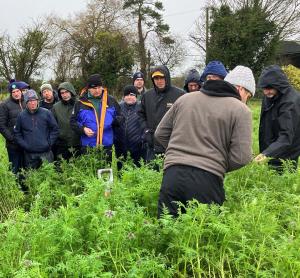Farm Innovation Visit focuses on soil health and water quality
Date published:
The College of Agriculture, Food and Rural Enterprise (CAFRE) recently led a Farm Innovation Visit (FIV) to Co Kildare and Co Meath.

The purpose was to learn about innovations being implemented on farm to improve soil health and water quality.
The first day focused on innovations in tillage enterprises to improve soil structure, biology and reduce sediment losses between crops. Robbie Byrne from Precision Nutrition explained how improving soil health starts with the basics of soil chemistry; optimising pH, Phosphorus and Potassium and supplying nutrients according to crop need.
Jonny Greene from Athy, Co Kildare grows malting barley among other crops on his farm. He described how his transition to direct drilling, moving away from traditional ploughing, was initially aimed at reducing labour. However, this shift has led to additional advantages, including enhanced soil organic matter, better soil structure, and improved soil biology. As a result, he has been able to lower input costs while boosting his profitability.
Norman and Michael Dunne from Maynooth have introduced several innovations, including the year-round use of cover crops. This approach ensures a continuous food source for soil biology populations, while enhancing biodiversity and improving plant health. Both farms used cover crops to minimise the time soil is bare. Cover crops reduce soil erosion helping to retain phosphorus and additionally absorb surplus nitrogen. They hold nutrients within the field which can be incorporated and used by the following crop. Having a living root present within the soil over the winter helps maintain soil structure, which in turn aids water infiltration. A soil pit dug demonstrated how the plant roots had broken through a soil pan to alleviate compaction.
Dermot Forristal, a Research Officer with Teagasc spoke to the group about the economic, environmental, and yield pros and cons of minimum tillage practices compared to ploughing. He highlighted how compaction limits production.
The group engaged in a conversation regarding the identification and minimisation of compaction. They discussed the careful considerations necessary when dealing with compaction on grassland and tillage enterprises.
The second day of the FIV focused on water quality with a visit to Larry Hannon’s dairy farm in Co Kildare. Larry outlined how his business has evolved with an increased appreciation of the environment. Advice from Teagasc emphasised the importance of sufficient slurry storage to last through the closed period.
It is best practice to have extra storage available in case of adverse weather conditions, like what was experienced in late 2023 extending into spring 2024. Contractors now spread slurry using LESSE with dirty water put out at the end of the closed period and slurry is applied a few weeks later, as grass growth increases.
It was highlighted that the derogation in Ireland was vital to ensure profitability within the dairy herd. Efforts had to be made to address water quality to ensure that the derogation could remain. With a river running through Larry’s farm it was an ideal location to learn the indicators of good and poor water quality.
Local Authority Water Programme (LAWPRO) scientists led a practical workshop. They demonstrated how small invertebrates can indicate the quality status of a river, and where pressures may be coming from.
An overview was given on the Agricultural Sustainability Support and Advisory Programme (ASSAP) and the partnership approach taken between catchment scientists and ASSAP advisers from both Teagasc and Tirlán. A confidential and free advisory programme is provided to farmers with a view to improving water quality in their areas.
ASSAP farmer participants can apply for funding for interventions to improve nutrient management on their farms.
With current water quality issues in Lough Neagh this partnership approach in Southern Ireland is something that could be modelled in Northern Ireland to help improve water quality.
Notes to editors:
- Follow DAERA on X formerly called Twitter and Facebook.
- All media queries should be directed to the DAERA Press Office: pressoffice.group@daera-ni.gov.uk or telephone: 028 9016 3460.